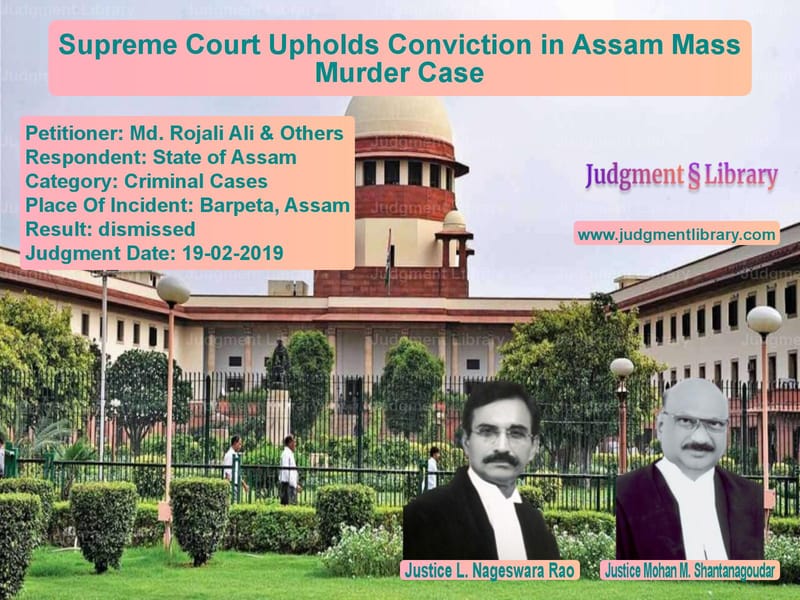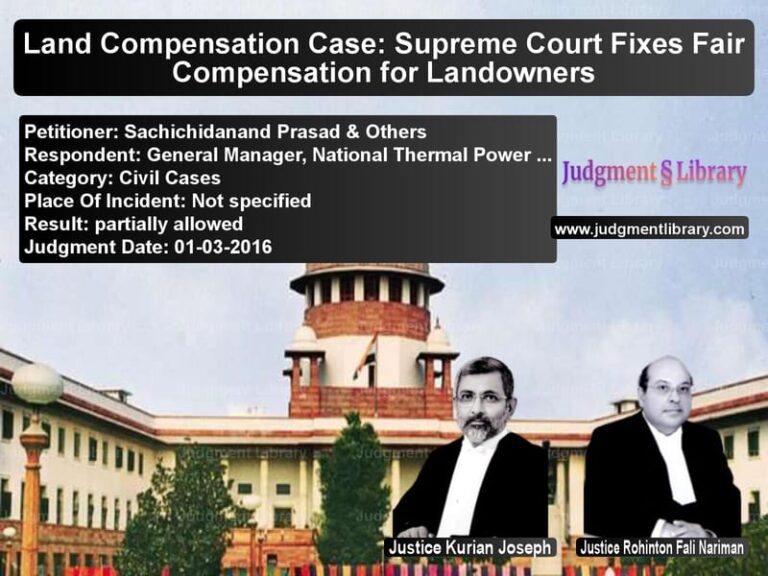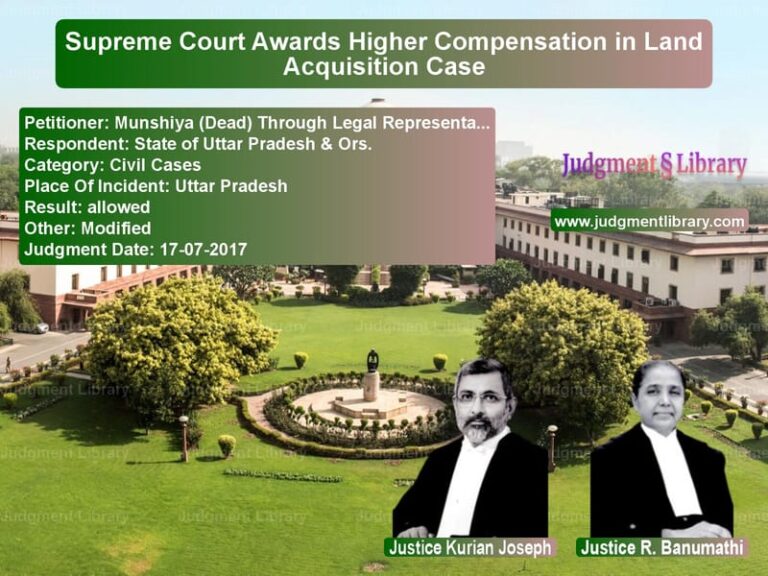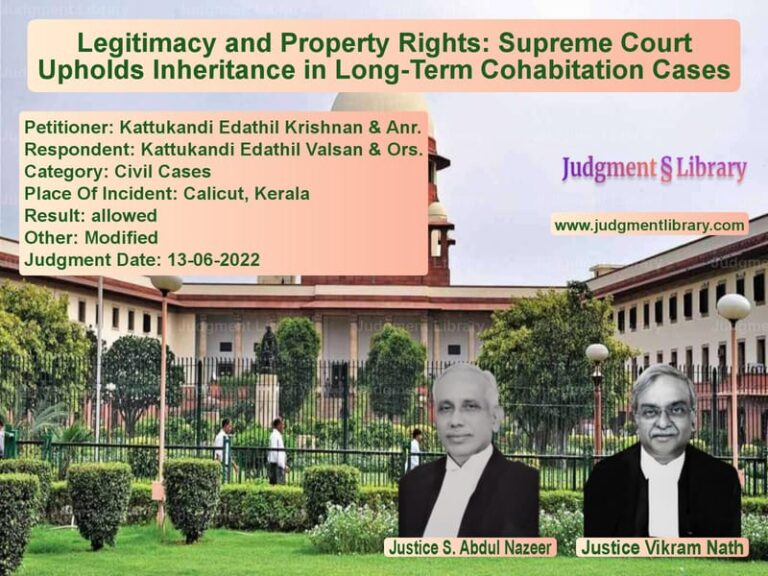Supreme Court Upholds Conviction in Assam Mass Murder Case
The Supreme Court of India, in the case of Md. Rojali Ali & Others vs. State of Assam, upheld the conviction of multiple accused involved in the brutal murder of four individuals in Assam. The case, which stemmed from a violent attack in 1995, saw a group of armed men trespassing into a house and murdering the victims in cold blood. The Court dismissed the appeal, affirming the conviction under Sections 148, 323, and 302 read with 149 of the Indian Penal Code (IPC).
Background of the Case
The case revolved around an incident that took place on November 9, 1995, in Barpeta district, Assam. The prosecution’s case was that 26 individuals, including the appellants, armed with deadly weapons such as spears, arrows, and lathis, surrounded the house of Md. Aziz Ali, Md. Kutub Ali, Md. Mamud Ali, and Samir Ali at around 6:00 AM. They forcefully trespassed into the house, dragged the victims outside, and assaulted them mercilessly. As a result, the four victims succumbed to their injuries.
The First Information Report (FIR) initially named 26 accused, but a charge sheet was eventually filed against 15 individuals. During the trial:
- One accused passed away.
- Two accused absconded.
- The trial proceeded against 12 individuals, out of whom eight appellants were convicted.
The Trial Court convicted the appellants under Sections 148, 323, and 302 read with 149 IPC. This conviction was subsequently upheld by the Gauhati High Court, leading to the appeal before the Supreme Court.
Arguments by the Appellants
The defense counsel contended:
- All six eyewitnesses were related to the victims, which could indicate bias.
- The motive behind the crime was weak and based on a minor altercation between a witness and one of the accused over a bicycle collision.
- There was no clear intention to commit murder.
- No weapons were recovered from the accused.
- The prosecution had suppressed the death of Turen Ali, a member of the accused party, who was also killed during the same incident.
- Six other members of the accused party sustained injuries, which the prosecution failed to acknowledge.
Arguments by the State of Assam
The State’s advocate argued:
- The conviction was based on strong eyewitness testimony.
- The crime was premeditated, and the accused acted with a common intention.
- The prosecution presented a clear and consistent case.
- The High Court correctly upheld the lower court’s findings.
Supreme Court’s Analysis and Judgment
The Supreme Court carefully reviewed the evidence and arguments, highlighting key observations:
1. Credibility of Eyewitnesses
The Court acknowledged that all six eyewitnesses were closely related to the deceased but held that this alone was not sufficient to discredit their testimony. Referring to precedents, the Court reiterated:
“A related witness cannot be said to be an ‘interested’ witness merely by virtue of being a relative of the victim.”
The Court cited previous rulings, including Dalip Singh v. State of Punjab (1954), which held that family members of a victim are often the most natural witnesses and their testimony should not be discarded merely due to their relationship with the deceased.
2. Presence of the Accused at the Crime Scene
The Court found that all eyewitnesses consistently identified the accused as active participants in the crime. Additionally, PW7 (Atar Ali) was an injured eyewitness who provided a detailed account of the assault.
3. Pre-planned Attack
The Court noted that the attack took place early in the morning, suggesting premeditation. The accused were armed with spears, arrows, and lathis, which indicated prior intent to commit serious violence.
4. Motive and Circumstantial Evidence
The Court rejected the argument that the motive was weak, emphasizing that the overwhelming evidence of the attack was sufficient to sustain the conviction.
5. Suppression of Counter-Case
The defense alleged that the prosecution suppressed details regarding the death of Turen Ali, who belonged to the accused party. The Supreme Court noted that there were counter-cases related to this incident, and separate trials were held. However, it ruled that the conviction in the present case must be determined based on the evidence on record.
6. Common Intention and Unlawful Assembly
The Court upheld the Trial Court’s and High Court’s findings that the accused were part of an unlawful assembly with the common object of committing murder. It cited Section 149 IPC, which makes every member of an unlawful assembly liable for offenses committed in pursuit of a common object.
Final Judgment
- The Supreme Court dismissed the appeal.
- The conviction under Sections 148, 323, and 302 read with 149 IPC was upheld.
- The Court ruled that the accused had a common intention to kill and acted in furtherance of this objective.
Impact and Significance of the Judgment
- Reinforcement of Eyewitness Testimony: The ruling clarifies that the testimony of relatives of a victim cannot be discarded solely on the basis of their relationship.
- Common Intention and Group Liability: The Court reaffirmed the principles of unlawful assembly and joint liability under Section 149 IPC.
- Limited Scope for Appeal in Concurrent Convictions: The judgment highlights that appellate courts rarely interfere with concurrent findings unless there are glaring errors in appreciation of evidence.
Conclusion
The Supreme Court’s ruling in Md. Rojali Ali & Others vs. State of Assam is a significant precedent in cases involving group crimes and mass murders. The judgment reinforces the reliability of eyewitness testimony and upholds the principles of common intention and unlawful assembly under Indian criminal law. By affirming the conviction, the Court ensures justice for the victims while upholding due process.
Petitioner Name: Md. Rojali Ali & Others.Respondent Name: State of Assam.Judgment By: Justice L. Nageswara Rao, Justice Mohan M. Shantanagoudar.Place Of Incident: Barpeta, Assam.Judgment Date: 19-02-2019.
Don’t miss out on the full details! Download the complete judgment in PDF format below and gain valuable insights instantly!
Download Judgment: Md. Rojali Ali & Oth vs State of Assam Supreme Court of India Judgment Dated 19-02-2019.pdf
Direct Downlaod Judgment: Direct downlaod this Judgment
See all petitions in Murder Cases
See all petitions in Judgment by L. Nageswara Rao
See all petitions in Judgment by Mohan M. Shantanagoudar
See all petitions in dismissed
See all petitions in supreme court of India judgments February 2019
See all petitions in 2019 judgments
See all posts in Criminal Cases Category
See all allowed petitions in Criminal Cases Category
See all Dismissed petitions in Criminal Cases Category
See all partially allowed petitions in Criminal Cases Category







